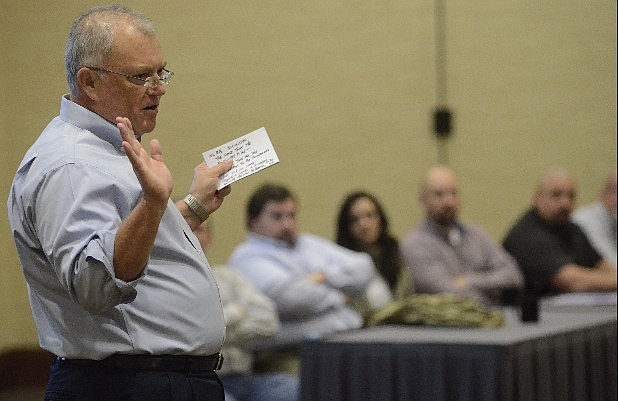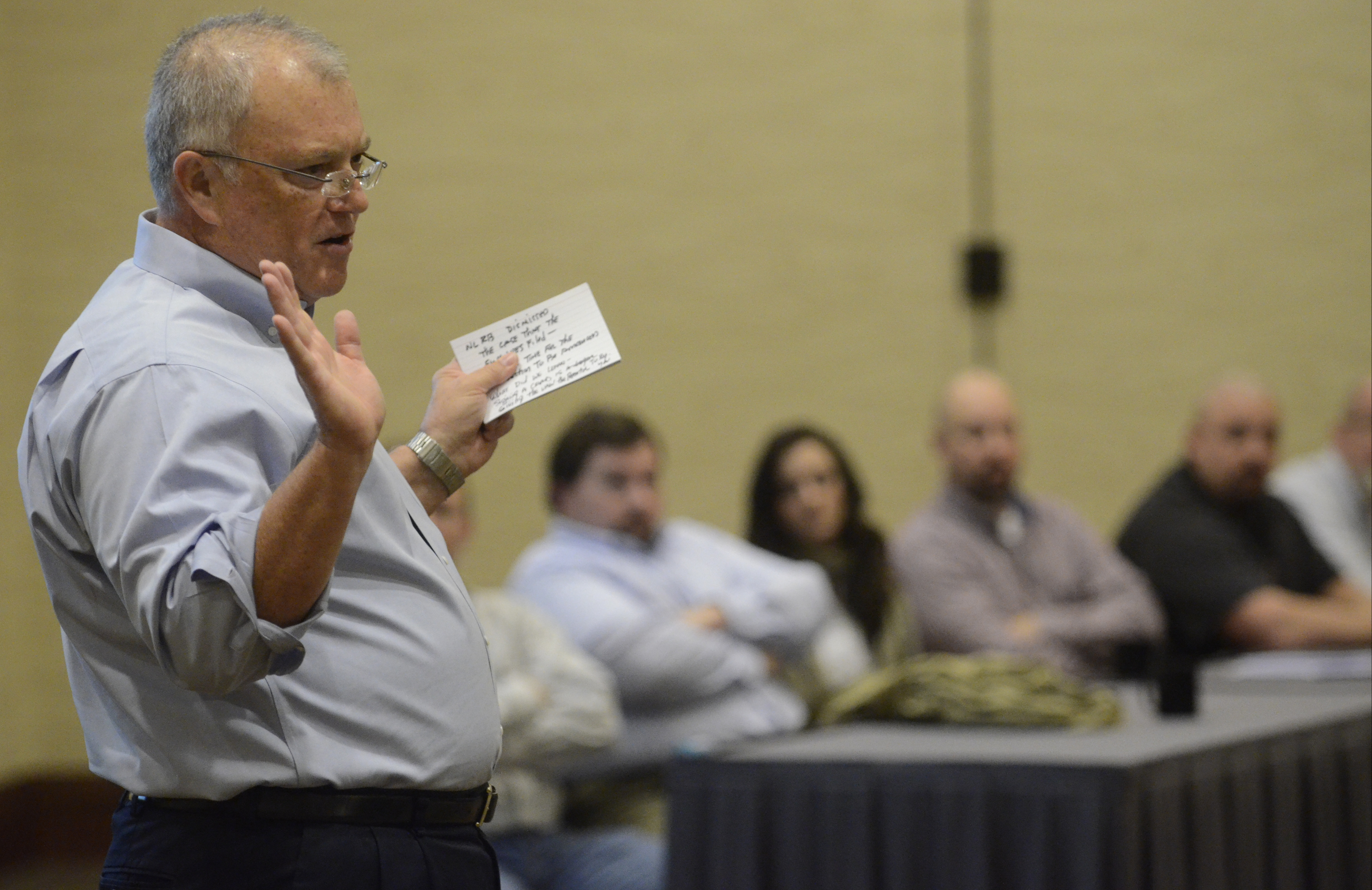View our special coverage
Union supporters and critics are stepping up activity ahead of this week's vote on organizing the Chattanooga Volkswagen plant in a city that's now ground zero in the fight over the future of the United Auto Workers in the South.
Two top officials in VW's works council network said Saturday in Chattanooga that they want to see a labor board crafted at the plant that doesn't follow the German model but rather is a fit for the U.S.
Meanwhile, a former president of manufacturing at the plant said he thought the UAW would hurt efforts to bring a new sport utility vehicle assembly line to Chattanooga.
Read moreUAW supporter sees victory in voteLook at the Detroit 3, union opponent says
Also, two top plant officials defended both the call for the election and its fairness even as some inside and outside the plant complain VW and the union are rigging the election process for the UAW.
Gunnar Kilian, general secretary of the Volkswagen Group Works Council, said if workers endorse the UAW this week, he wants to see an American model of the labor board develop.
"It's important that the people in the house have a say," he said. "It's driven by the people in the house."
Frank Patta, who is general secretary of the European and World Group Works Council for VW, said the idea is to "facilitate a works council based on the needs of the plant here."
Volkswagen at a glanceHeadquarters: Wolfsburg, GermanyFounded: May 1937Global sales: $254 billionGlobal staff: 501,956 employeesFacilities: 62 plantsCEO: Martin WinterkornChattanooga staff: 2,700 employeesChattanooga product: PassatUAW at a glanceHeadquarters: DetroitFull name: The International Union, United Automobile, Aerospace and Agricultural Implement Workers of AmericaFounded: 1935Membership: 390,000 active members, down from a peak of 1.5 million members in 1979President: Bob KingTennessee presence: UAW represents more than a dozen employers across Tennessee, including General Motors and Ryder Logistics in Spring Hill; TRW in Lebanon; Carlex in Nashville and Vonore; Fleetguard and Dacco in Cookeville; Lear in Morristown; Hennessey in LaVerne; GM CCA and Daimler Parts NA and Ford PDC in Memphis; and Dana in Paris. UAW also has represented the nearby GM facility in Bowling Green, Ky., and Chrysler Electronics in Huntsville, Ala.
"It's from the people, for the people ... Americans," said Patta, whose brother, Sebastian, is vice president of human resources at the Chattanooga plant.
The UAW has said that it will work with VW to set up a works council and establish a new standard for labor-management relations in the U.S. VW has indicated it wants to work with the union to craft the first works council at a U.S. auto plant.
A three-day vote on whether to recognize the UAW at the plant is slated for Wednesday through Friday.
Also Saturday, Don Jackson, former president of manufacturing at the Chattanooga plant, said adding a union "will not be good" for attracting a new sport utility vehicle.
"I don't know that for a fact, but it's just economics," said Jackson, who worked at the Chattanooga plant for four years before retiring in 2012.
Jackson, speaking to about 65 people at an anti-UAW meeting, said the union would increase costs at the Chattanooga factory by 20 percent to 30 percent. He said that an announcement about producing an SUV already would have been made if VW had met its cost targets in Chattanooga.
Jackson, one of more than half a dozen speakers at the meeting, said suppliers also won't want to locate near the plant, which would drive up transportation costs related to assembling the SUV.
"Suppliers won't come if there's a union environment," he said.
However, Mike Herron, chairman of UAW Local 1853 in Spring Hill, Tenn., said the General Motors plant there hasn't had any shortage of suppliers to serve the unionized factory.
"When we first arrived, they were willing to locate in the area," he said. "Everybody is interested in making money. They don't care if it's a unionized environment."
Gary Casteel, a UAW regional director, said the union is committed "to keeping VW costs competitive with its competition and advocating they receive new product," specifically the SUV.
VW has said that Chattanooga is the front-runner to produce a new seven-seat SUV, but Mexico also is competing for the work. The Chattanooga factory now makes only the Passat sedan.
•••
Volkswagen workers said they will choose one of two futures this week for the Chattanooga plant and the UAW.
Pro-UAW employees said their vision includes "co-determination," whereby the workforce joins its German brethren and management to create a new model of U.S. labor relations that brings more product and jobs to the city.
Anti-UAW workers say that if the union comes in, the plant's future will be dragged down by an unneeded third party. They raise the specter of New Stanton, Pa., where some say a militant UAW coupled with German managers who didn't understand the U.S. market turned VW's last American plant into a ghost factory 26 years ago.
For employee Richard Isbell, the answer on whether to endorse the UAW is an unqualified "yes."
"It's a 21st century approach" to labor-management issues, he said.
In the works council, blue- and white-collar employees can discuss day-to-day operations such as hours, training and safety. VW has said a union is needed to implement a works council under U.S. labor law. The UAW would bargain with the company on issues such as pay and benefits.
However, Mike Jarvis, a body shop team leader who doesn't support the UAW, said he has been in three unions.
"That's not the environment you want," he said Saturday. "We don't need any outside influences."
Sean Moss, another employee, questioned why UAW membership has fallen nationally.
"If this is such a great deal, why don't other people want it?" he asked.
The UAW, like nearly all labor unions, is struggling to add new members. Membership is around 390,000 and has been growing in recent years but doesn't compare to its 1979 peak of 1.5 million. The Chattanooga plant would become the first belonging to a foreign automaker in the South that becomes unionized, which could open the path for the UAW at other so-called "transplant" factories.
•••
Lon Gravett, a pro-union worker, said the UAW can help workers in a lot of ways, including money.
"There's room for improvement in pay and benefits," he said. "VW is the global No. 2 carmaker. They're growing by leaps and bounds, and there are other places in the world where employees make a lot more."
The VW wage scale starts at $15 per hour and rises to $21 per hour over five years. UAW workers' pay starts at $15.78 per hour and rises to $19.28 per hour after four years. Legacy UAW workers under an older pay scale make an average of $28.12 per hour.
UAW representation would come with dues. The UAW is hiking dues by 25 percent, the first increase since 1967. On paper, it's equal to two and a half hours per month instead of two for hourly workers.
A production worker paid $20 per hour would contribute $50 a month, or $600 a year. Multiplied by 1,500 people, roughly the number of people who will vote, that amounts to $900,000.
But since Tennessee is a right-to-work state, employees don't have to join the union or pay dues.
Union officials have said the money will support the UAW strike fund, which holds $600 million. Officials would like to get it back up to $1 billion.
The UAW also can negotiate bonuses.
Hourly workers now can earn a bonus of as much as 14 percent of their earnings -- base wages plus overtime. The bonuses, paid quarterly, are based on meeting targets in indicators such as safety, quality, productivity and attendance.
But Gravett said there are other issues, such as the working environment and improving ergonomics for workers, that the union could address.
Casteel said the union has never promised better wages and benefits.
"They have many issues out there," he said. "It's about making the plant as productive and efficient, having uniform standards and processes. VW likes it that way."
For example, he said, if a worker has an issue and passes it along to a supervisor who does nothing, currently there's little recourse.
"In an organized situation, there's a structure to get information up there" to top managers, he said.
•••
However, hanging over this week's election are charges by some VW employees and the National Right to Work Foundation that the carmaker and the UAW have colluded to steer the outcome in their favor.
Glenn Taubman, a foundation attorney, said there was a "backroom election agreement" in which VW and the UAW prearranged this week's balloting along with the National Labor Relations Board.
He said VW and the UAW purposely chose a nine-day "quickie" timetable between the date the petition for the election was filed with the NLRB, last Monday, and the start of the balloting Wednesday. The NLRB will supervise the election.
Taubman said VW and the UAW agreed to align and coordinate their public relations messages, to conduct pro-UAW captive-audience speeches at the factory and to provide UAW organizers with wide in-plant access that shut out rival voices.
"Volkswagen has got the nerve to call itself neutral," he said. VW and the UAW have a "neutrality agreement."
Employee Travis Finnell said Saturday at the anti-union meeting he often hears the remark that the union will give workers a better voice.
"Who here had a voice in the neutrality agreement?" he asked.
But Kilian, of the Group Works Council, said VW and the UAW have left the decision up to the workers.
"The only question is whether the workforce here would like to be represented in this fashion," he said. "It's up to our colleagues."
Frank Fischer, who head's VW's Chattanooga operations, said a works council is part of a proven business model.
"Our plant in Chattanooga has the opportunity to create a uniquely American works council, in which the company would be able to work cooperatively with our employees and ultimately their union representatives, if the employees decide they wish to be represented by a union," he said in a statement.
Sebastian Patta said a secret ballot election "furthers values at Volkswagen America and will help us grow stronger in the future with our employees."
"Our employees are free to discuss and state their opinions at the plant and to distribute campaign materials, including fliers and other literature, irrespective of whether they are in favor of or against a union," he said.
John Raudabaugh, a law professor and former NLRB board member who also does work for the foundation, was critical of the short gap between the filing of the petition and the start of voting Wednesday. He said there's typically up to 42 days before an election is scheduled.
"It's the most slam-bam thing I've ever seen in my career," he said.
Raudabaugh also questioned if the union will really fully yield to the works council. He said that in Europe, where works councils are common, unions have simply installed many of their people on the labor boards.
"If you think the UAW will sit back and not be involved, that's crazy," he said.
Isbell said he didn't believe the process has happened too quickly, noting organizing has been going on for a couple of years.
"There's been plenty of time to express how you feel," he said.
Contact Mike Pare at mpare@timesfreepress.com or 423-757-6318.

